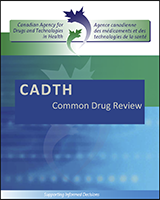One multinational, manufacturer-sponsored 24-week DB RCT, and its DB extension (i.e., total of 76 weeks), met the inclusion criteria for this review. In a population with type 2 diabetes inadequately controlled on metformin and a sulfonylurea, the addition of empagliflozin elicited a statistically significant improvement over placebo at both the lower (10 mg) and higher (25 mg) doses studied. Addition of empagliflozin to dual therapy also resulted in a statistically significant improvement in fasting plasma glucose, and a statistically significant weight loss, again at both doses studied. The weight loss was small (approximately 2 kg on average) but would be considered clinically significant in a population in which weight plays an important role in the pathophysiology of the disease, and in which interventions for the disease often lead to weight gain. In addition, there was a statistically significant reduction in SBP versus placebo at both empagliflozin doses; however, the decrease was small (2 mm Hg to 3 mm Hg) and of questionable clinical significance. The included study was not designed to assess quality of life. The one trial included in the review was small and of relatively short duration for the condition being studied, given that microvascular and macrovascular complications of type 2 diabetes take years to develop. The trial was not designed to assess the effect of empagliflozin on morbidity or mortality outcomes. The overall risk of harms (adverse events, serious adverse events) did not appear to differ between empagliflozin groups and placebo, although the study was not powered to assess harms. Empagliflozin may increase the risk of genital infections and of UTIs in female patients, although these findings are again limited by statistical power. When combined with a sulfonylurea and metformin, empagliflozin may entail a higher risk of hypoglycemia versus dual therapy; however, again, the study was not powered to assess risk of hypoglycemia. There is a lack of direct data comparing empagliflozin with its other comparators; however, data from an NMA suggest that empagliflozin had similar A1C responses and safety outcomes versus key comparators and was able to elicit a statistically significant weight loss compared with DPP-4 inhibitors.

